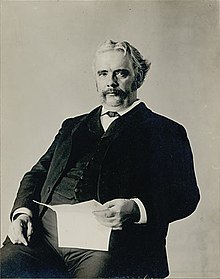William John McGee
William John McGee (born April 17, 1853 in Dubuque County , Iowa , † September 4, 1912 ) was an American inventor , geologist , anthropologist and ethnologist .
Life
In his youth, McGee worked on a farm and in a farrier, then as a surveyor . As an autodidact , he acquired a thorough knowledge of Latin and higher mathematics . In the early 1870s he moved to Farley , near Dubuque . There he invented some mechanical devices, especially improvements to agricultural implements, which he patented . During this time he also turned his attention to geology and archeology .
From 1877 to 1881 he carried out a topographical and geological mapping in an area of over 44,000 km² in northeastern Iowa , which primarily served to research the loess deposits in the Mississippi valley . This was the largest land survey ever carried out by an amateur at his own expense . He also examined the Great Quaternary Lakes in Nevada and California , as well as a recent fault on the mid- Atlantic slope . In 1881 he was accepted as a geologist with the United States Geological Survey .
From 1883 to 1893 he was responsible for the activities of the USGS in the Atlantic coastal plain . In this role he compiled many geological maps and carried out his own field work in an area of over 777,000 km². In numerous publications he established various new foundations in glaciology and general geology , and in 1887 he represented the USGS at the International Geological Congress in Berlin . A year earlier he had studied the effects of the Charleston earthquake .
From 1893 to 1903 McGee led the Bureau of American Ethnology in Washington and explored the Seri -Indianer on the Shark Island in the Gulf of California .
In addition, McGee was visiting professor of anthropology at the State University of Iowa , acting chairman of the American Association for the Advancement of Science (1897–98), chairman of the Anthropological Society of Washington (1897–99), vice president (1998–99) and president (1904–05) of the National Geographic Society , first chairman of the American Anthropological Association (1902–12) and vice president of the Ordicalogical Institute of America . He founded the Columbia Historical Society and was the first editor of the Geological Society of America . As an anthropologist, McGee studied the beginnings of agriculture, domestication of pets, marriage, and much more.
At the 1904 World's Fair in St. Louis , McGee headed the anthropological department.
Works
- The Pleistocene History of Northeastern Iowa , 1889.
- The Geology of Chesapeake Bay , 1888.
- The Siouan Indians , 1895, archive.org .
- Primitive Trephining , 1897.
- The Seri Indians , 1899.
- Primitive Numbers , 1901.
- Soil erosion , 1911.
- Wells and Subsoil Water , 1913.
Web links
Individual evidence
- ^ A b c d Benjamin F. Gue: History of Iowa From the Earliest Times to the Beginning of the Twentieth Century . Volume 4. 1903, p. 176 ( Wikisource ).
- ^ WJ McGee, RE Call: On the loess and associated deposits of Des Moines, Iowa . In: The American Journal of Science , No. 124, 24 (141), 1882, pp. 202-223
- ↑ a b McGee, WJ . In: James Grant Wilson, John Fiske (Eds.): Appletons' Cyclopædia of American Biography . tape 4 : Lodge - Pickens . D. Appleton and Company, New York 1888, p. 117 (English, full text [ Wikisource ]).
- ^ WJ McGee, WD Johnson: Seriland . In: The National Geographic Magazine , Volume 7 (4), 1896, pp. 125-133.
| personal data | |
|---|---|
| SURNAME | McGee, William John |
| BRIEF DESCRIPTION | American geologist and anthropologist |
| DATE OF BIRTH | April 17, 1853 |
| PLACE OF BIRTH | Dubuque County , Iowa |
| DATE OF DEATH | September 4, 1912 |
